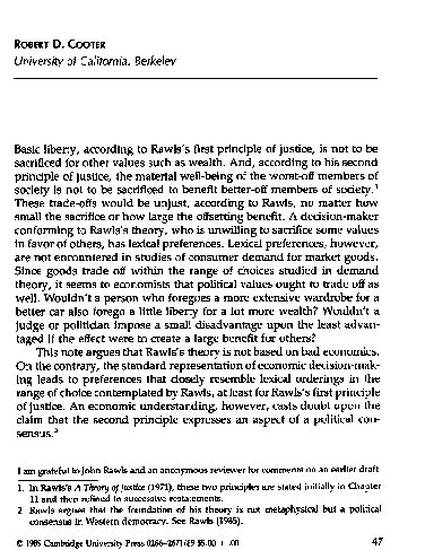
Article
Rawls's Lexical Orderings are Good Economics
Economics and Philosophy
(1989)
Abstract
Basic liberty, according to Rawls's first principle of justice, is not to be sacrificed for other values such as wealth. And, according to his second principle of justice, the material well-being of the worst-off members of society is not to be sacrificed to benefit better-off members of society. These trade-offs would be unjust, according to Rawls, no matter how small the sacrifice or how large the offsetting benefit. A decision-maker conforming to Rawls's theory, who is unwilling to sacrifice some values in favor of others, has lexical preferences. Lexical preferences, however, are not encountered in studies of consumer demand for market goods. Since goods trade off within the range of choices studied in demand theory, it seems to economists that political values ought to trade off as well. Wouldn't a person who foregoes a more extensive wardrobe for a better car also forego a little liberty for a lot more wealth? Wouldn't a judge or politician impose a small disadvantage upon the least advantaged if the effect were to create a large benefit for others?
This note argues that Rawls's theory is not based on bad economics. On the contrary, the standard representation of economic decision-making leads to preferences that closely resemble lexical orderings in the range of choice contemplated by Rawls, at least for Rawls's first principle of justice. An economic understanding, however, casts doubt upon the claim that the second principle expresses an aspect of a political consensus.
Disciplines
Publication Date
June, 1989
Citation Information
Robert Cooter. "Rawls's Lexical Orderings are Good Economics" Economics and Philosophy (1989) Available at: http://works.bepress.com/robert_cooter/89/
